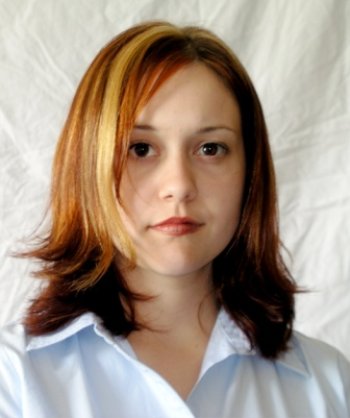 click on image to visit Flo Paris' website Image © Flo Paris 2006 |
Flo Paris
Practice Room
artist reflections and album review
review and interview © Russ Elliot 2006
click on images to visit artist's website
formatted for 800 x 600 or larger windows
Last updated: 30 December 2006
While Flo Paris began her music career long before, Glass Hammer listeners were probably the first to discover the artist's tremendous vocal talents in her work with the Chatanooga-based progressive rock band. She has contributed distinctive solo parts and backing harmonies to the band's albums, live performances and can be seen performing DVDs alongside Suzie Bogdanowicz and Bethany Warren.
Flo began work on her debut solo album Practice Room before meeting Steve Babb and Fred Schendel, however the three artists worked together--at times on opposite coasts of the United States--to complete the project.
The album was released in June 2006. We caught up with Flo again to discuss her background, the making of Practice Room and her plans for the future. The results of our interview are presented below. Our review follows.
Interview
Musical Discoveries: Flo, can you tell us more about your background.
Flo Paris: I grew up in a musical family. My late father was an accomplished guitarist and my mother was a singer. She had actually been signed with Warner Brothers at one point, but was dropped from the label as soon as they found out she got married! They played in nightclubs in the 60s and 70s all throughout southern California.
By the time I was born, they had stopped playing live, and moved the family to the central coast of California. Early on, my dad taught both of my older brothers guitar--my brother Martin Paris is a professional solo guitarist and my brother Brandon Paris is featured on my album--and I took piano lessons, but would later pick up the guitar as well. I was also strongly encouraged to perform. My dad would play guitar and I would sing Whitney Houston songs, or songs from the musical Annie for visiting family or friends. I had begged my parents to let me audition for the Mickey Mouse Club, but looking back, I am pretty glad I didnít, or my musical style and career may have taken a completely different turn!
How did you develop your musical talent further?
As I grew up, I was involved in church and school choirs, as well as fine tuning my piano skills and picking up the guitar. I listened to artists that were extremely diverse, such as Amy Grant, Whitney Houston, Reba McEntire, Mariah Carey, Christian artist Crystal Lewis, Nanci Griffith, and my favorite, Sarah McLachlan--and I have to admit-Debbie Gibson at one point!
In my senior year of high school, our school participated in something called the ASCI Musicale in Pasadena, CA, which is a gathering of all the Christian schools in southern/central CA to perform a set of songs together as well as compete. I wrote my first Jazz composition with Tonye Holyde--my music teacher, as well as one of my mentors--for the event as a competition piece, but lost because they said I was too "breathy"! It was a jazz piece, so, "breathy" was actually what I was going for!
So after that minor setback, what did you do next?
I decided to head to Fullerton College the next year as a Vocal Jazz major, and hopefully transfer to Berklee School of Music in Boston later. I was at Fullerton for a year, where I sang in the vocal jazz choir, the concert choir, and got to sing with them all around southern CA as well as going on a choral tour to China.
 Image © Flo Paris 2006 |
I learned so much that year, including musical theory, and how to scat. I also had a lot of free time between classes, so I would take just camp out in one of their many practice rooms and play piano, or guitar and this is where the real writing of music began. In fact, most of the songs on the record were written during this time--yes, that was about eight years ago--and that is where the album title came from.
How did things work out for you at Fullerton?
I actually decided that Fullerton was not for me and moved back to San Luis Obispo, and attended Cuesta College, again being involved in the vocal jazz ensemble and concert choirs. By the following spring I released my first demo album, consisting of four songs that were written by Tonye Holyde and myself.
What happened to the demo?
I took that demo to Tennessee to drop off at various labels, but nothing ever came of it, and I came back home and actually wound up getting engaged. After I was married in 2001, my husband and I decided to move to Tennesse where two of my siblings had already relocated.
This must be the beginning of the Glass Hammer connection ...
We moved to Chattanooga in hopes of him finding a good job, and some good musical networking for myself. We began attending church where I met Susie Bogdanowicz, who introduced me to Steve Babb and Fred Schendel. They offered to produce my first album, and I began recording at their studio, and it was shortly after that, that they asked if I would be interested in singing with Glass Hammer at NEARfest 2003 in New Jersey. Of course, I said yes, and thus began my exposure to, and involvement in Glass Hammer, and progressive rock music in general.
So when did you actually complete Practice Room?
I completed the recording for Practice Room shortly before my first daughter was born in 2004, and then my husband and I moved back home to California.
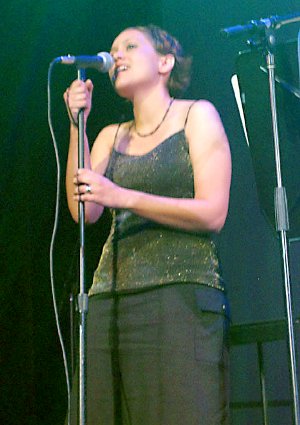 Image © Flo Paris 2006 |
What's the relationship between Susie, Bethany and you like?
We have a lot of fun when we get together for recording, or rehearsals or playing live. There is usually a lot of laughing! Since I donít live in Tennessee now, I donít see them other than when we play together, but I look forward to it every time.
Can you also tell us a bit about the experience of working with the Glass Hammer?
I was introduced to Steve Babb through Susie, and was asked to sing at NEARfest with GH shortly after that. I liken singing with GH to going to college. I seriously feel like learning the parts, and rehearsing is the equivalent of taking classes, because the music is so complicated--in a good way--and thoughtful.
I really feel like it helps in all areas of my music. Even if my music isn't progressive, or classically based, having that background helps me in my writing and knowledge of music in general.
I can't claim any writing contributions with GH, it's all them! I am encouraged though, to sing the parts they give me in "my style" how I want to and I appreciate that.
Did you feel GH have given you ample opportunity to participate?
I have been more than pleased with the material I have had the opportunity to sing with GH. Every time they send me something for a record, I always feel like saying, "Are you sure? I get to sing that?!" I especially felt that way on "Having Caught A Glimpse." I couldnít believe they wanted to feature my vocals on a piece of that magnitude. I loved it. As far as working with GH, it's always great. That sounds simplistic, but it's true that I enjoy every minute of every performance with GH.
Can you tell us anything about what it was like to work at the NEARfest and Belmont gigs?
Of course, I never have all of the responsibilities of putting on a show that Steve or Fred have, all I have to do is know my vocal parts, so I feel like it's probably a little unfair that I get to have so much fun while everyone else is stressing out! NEARfest was my first big concert, and it was a life changing experience. It was amazing to be part of something so huge, and it was a real honor.
We were especially pleased with your contributions to Eric Parker's album All This Time. Aside from the Glass Hammer clan's involvement, how was it that "Practice Room" came to be included on the project?
Eric Parker and I knew each other because we are both GH members, and he asked to put "Practice Room" on his compilation. I think my record was almost done at this point, and Eric thought "Practice Room" would be the most fitting song for his record, which I totally agree with.
 Image © Flo Paris 2006 |
How would you characterize the Practice Room album for our readers? Can you tell us about your favorite tracks, some of the vocal effects and also the arrangements.
Because of the lyrical content, it would probably automatically be placed into the "Christian Music" genre. Musically, I would say it is a blend of Folk, Pop and Rock and since all of the tracks are originals, it would also fit into the singer/songwriter category.
I think I would have to say that "Not I," "Practice Room," and "The Love That We Have Found" are my favorite tracks. I like "The Love That We Have Found" because it's so jazzy, and I was able to use my jazz training, but mostly because it's for my husband.
Because the record was written over such a long period of time, it represents a lot of different styles, and whatever I happened to be listening to, or studying at the time comes through in each track.
What I like about "Not I" is that it's the most like what I listen to now, and the direction I would like to be heading in-which is really bluegrass based. I love the mandolin on that song. Iím glad I didnít know how much I actually liked the mandolin at the time, or I might have gone overboard and used in on every track!
The song "Practice Room" is so powerful, and I really have Steve and Fred to thank for that. They turned a simple guitar tune into this incredible masterpiece--I couldnít believe the end result. In the studio, I would just play or record a scratch track with my guitar and vocals, and come back later to see what Steve and Fred had done with it, and every time they added something to it, it sounded more amazing. I couldn't believe my music could sound like that.
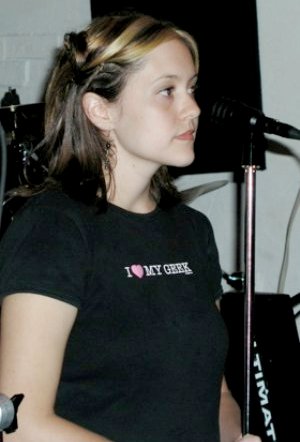 practicing with Glass Hammer Image © Flo Paris 2006 |
Can you tell us what you draw from when preparing the music and the lyrical messages?
The people I spend time with are always challenging me with their ideas and thoughts about life, and God, and the world around them, and I am very fortunate to have that community with lots of dialogue going on about what I believe to be the most important issues in life. A lot of the lyrical content comes from these conversations, or sermons I hear at church, or even conversations I have with my husband in the car, when I least expect it to turn into a song.
When it comes to the lyrics, I have to say it is much more of a deliberate process. I'll decide that a song needs to be written about something. In fact a lot of times I bring up some realization I've had to my husband and heíll say. "Sounds like a good song." Then I'll sit down and think it through, write down ideas, and get the message out.
The music is much different, and much more emotional. It usually comes separate from the lyrics and I just sit down and play until something sounds pretty. Sometimes it matches lyrics I've already written, or sometimes I write music to go with the lyrics.
The album presents clear and very personal religious themes and messages although we would say that it is not "in your face."
I am very fortunate to have a social circle of friends who are constantly talking about these things. Since it is what's constantly in my thoughts, and in my heart, I believe it comes out a lot less forced than what it would be if I just thought to myself, "Iím gonna write some Christian songs, since thatís what I am." It's really what I think about, and I just want to share that with people.
Will you list the ways that the folks from Glass Hammer contributed to the project?
Steve Babb and Fred Schendel produced the album, and really, helped trained my ear and coached me on how to be a good producer as well. They played on almost everything except a couple of piano driven songs that I played myself.
Susan Hawkins and the Adonia String Trio also were featured on the record, and I couldn't be happier with how it turned out. The strings are so beautiful; they could never be paralleled by synthesized strings, so I'm really glad they were part of it.
Did you have to do much work remotely?
The whole record was done before I moved back to California, but none of the mixing or mastering had really even begun, so all of that was handled via email or the telephone. There were a lot of times when I would email or call and say something like, "Stop that track at 3:11 are you SURE you don't hear anything weird??" That combined with having a newborn, and later getting in a bad auto accident, really delayed the release of the record.
 Image © Flo Paris 2006 |
How has the reaction--your own, family, friends, fans--been to the album thusfar?
Overwhelming! Everyone I talk to is so positive and excited about it. It was actually harder for me to be excited since the record was written so long ago, and the release show took so much planning. I had felt really disconnected from the songs and really absorbed in the logistics and the business side of things, but at the release concert, I got to really let go of all of that and get a little more emotional again, reconnecting with the music. It was a great night, and the response to both the show and the record made all the hard work, and waiting well worth it.
Was it a challenge to relocate to California and become a mom more or less all at once?
Coming home is always easier. I'd say it was harder moving to Tennessee, not really knowing anyone and throwing in major culture shock on top of that. When we moved back home to California with our new baby, we had a huge, supportive community of friends and family that had known us our whole lives, and also, we were living right next to beach. When you move right next to the ocean after living somewhere where the humidity percentage AND the temperature reaches the 90s, Iíd say, its pretty easy to cope!!
Did these life factors contribute to the extended period between when Practice Room was announced and its ultimate release?
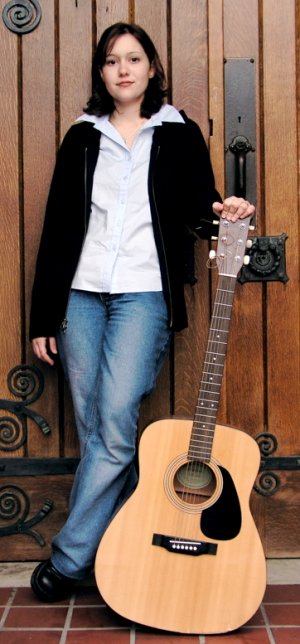 performing with Glass Hammer Image © Flo Paris 2006 |
Absolutely. I had no idea how life changing a baby would be. I didnít expect to stop wanting to practice, or even think about music. Also, in the summer of 2005 I got mono, and then was involved in a major auto accident, which left my right elbow shattered. That REALLY slowed things down. When I became pregnant this last winter, I decided I HAD to get the record out before the baby came, or it would never happen!
Did you always know you wanted to be a musician or did you have other aspirations?
I would say I've always known that I wanted to be a musician, but to what capacity always changed numerous times. Right now, I just want to be a really thoughtful independent artist who is able to articulate my thoughts and faith into something beautiful and meaningful. I am more concerned now, with using my art to glorify God as well as to provoke people to really think about things.
Besides being a wife, mom, singer, songwriter and Glass Hammer vocalist, what kinds of things do you have time for?
This may sound strange, but I am obsessed with natural childbirth, and childbirth education. My husband and I have briefly tossed around the idea of teaching childbirth classes. I also have recently taken up sewing, particularly, cloth diapers. My husband and I are really involved in our church, and we like cooking, watching Arrested Development and various documentaries.
Do you think that you will continue to work with Glass Hammer long term or is your involvement with the band likely to come to an end?
I really can't say what will happen in the future. Of course I would LOVE to be able to just fly out whenever there is an opportunity to sing or record with GH, and for now, that's what I do, but as my family is growing, it becomes increasingly more difficult. The nice thing, is that they are based where my brother and sister's families live, so it really does work much better than if it were some other random location. If I have a GH commitment, I usually wind up making a family vacation out of it.
What are your plans, hopes and dreams for the balance of 2006?
There are so many actually. Of course, I am most focused on the impending birth of my second daughter this August, but after that, I would really like to start writing again. It's been years since I've been able to focus on new material, without being concerned about getting all the older stuff out on an album first. I have a lot of ideas as well, a lot of them being centered on social justice--or social injustice, as the case may be--and how that relates to the world, the church, and me.
Album Review
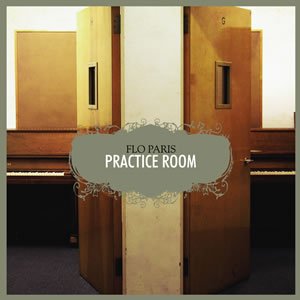 Image © Flo Paris Music 2006 |
Practice Room (Flo Paris Music (USA) 7 83707 37050 7, 2006) is an almost 40-minute collection of nine acoustic guitar-backed gentle rock tracks with a religious underpinning, however, the lyrical messages are never "in your face." Recorded at Sound Resources in Chattanooga, TN, the album is produced superbly in every respect.
While the album has been classified as a rock album, it never drifts far from singer/songwriter territory. Flo Paris has a distinctive mid-range voice with a wonderful natural clarity and lovely tone that the Sound Resources clan have perfectly captured in the recordings.
Flo (vocals, backing vocals, piano, ) is joined Steve Babb and Fred Schendel (acoustic guitar, electric guitar, bass, accordon, piano, pump organ, Mellotron, drums) on the album. The album also includes session performances by Brandon Paris (acoustic guitar), Summer Hullender (mandolin), Tiffin Barile (mandolin), Jay Stanfill (upright bass),
The album opens with "Not I," Flo's lead vocals accompanied acoustic guitar and mandolins. The upbeat track "Restless Night" is certainly one of the album's standouts. Fast-paced with acoustic percussion and acoustic guitar backing by Brandon, Flo's vocals glide above the arrangements. Listeners will especially enjoy the richly arranged piano-based ballad "Beautiful" that clearly illustrates the depth of Flo's vocal power. Harmony vocals contribute great texture in the song's mid-section. "The Love That We Have Found" is a richly arranged and bluesy track backed with piano and other instrumentation, including Fred Schendel on pump organ.
"Satisfied" is an upbeat rock track that explores the upper end of Flo's range and is certainly another album standout. Her voice soars above the instrumentation except when it is heavily processed in the beginning of the second verse and delivers lyrics flawlessly at an extremely rapid speed. Listen for her light backing harmonies in the choruses and Fred's brief organ solo in the mid-section. The Adonia String Trio joins Fred Schendel's piano and backs Flo in the everso sensitively sung "Getting Past The Apathy" (for Sarah). We especially enjoyed the way Flo's emotionally delivered vocal was processed on the recording and Fred's rich real string arrangement performed by the trio.
Flo performs the sensitive ballads "If" and "Live" (Special Thanks To Tonye Holyde) by herself--lead, backing vocals and piano--illustrating her range, depth and versatility in the performance. These two very natural recordings are absolutely delightful. The album concludes with the title track "Practice Room." It is a long and tenderly sung ballad that blends pop, progressive and country stylings and is the standout of the album. Fred Schendel (keyboards, piano, acoustic guitar, drums), Steve Babb (bass) and Susan Hawkins (viola) provide instrumentals. The song illustrates Flo's power, range and ability to deliver material evocatively.
 Practice Room met every expectation we had for Flo's debut. It is a tremendous debut album, introduction to the artist and the start of an exciting solo career!
Practice Room met every expectation we had for Flo's debut. It is a tremendous debut album, introduction to the artist and the start of an exciting solo career! 
Return to website contents